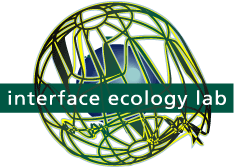 Play is essential human experience.
Play brings us together and enables emotional connect.
Games in provide a valuable context in which we take creative action, explore our emotions, learn, interact, and live.
The Interface Ecology Lab identifies digital games as a compelling domain in which to investiage human-computer and human-human interaction.
Play is essential human experience.
Play brings us together and enables emotional connect.
Games in provide a valuable context in which we take creative action, explore our emotions, learn, interact, and live.
The Interface Ecology Lab identifies digital games as a compelling domain in which to investiage human-computer and human-human interaction.
 Through play, gamers develop unique skills, experiences, and relationships.
This makes gamers an interesting demographic for study.
Drawing from their unique context, gamers provide new perspectives and insights on problems traditionally studied in other domains.
Through play, gamers develop unique skills, experiences, and relationships.
This makes gamers an interesting demographic for study.
Drawing from their unique context, gamers provide new perspectives and insights on problems traditionally studied in other domains.
A complex culture has emerged around games. New social media forms, such as live-streaming, enable gamers to share play experiences and form new communities. We are working to understand these new media forms and play communities.
We aim to leverage our understanding of play and games culture to not only create new meaningful play experiences, but to inform our understanding and design in other contexts.
projects
![]() We developed a series of digital games for Teaching Team Coordination (TeC).
We began with ethnography of fire emergency response work practice, developing understanding of situated contexts,
and design principles for simulations of team coordination in crisis response.
We mapped real-world actions map to game mechanics: players work together to achieve goals and avoid hazards.
We invented Zero-Fidelity Simulation,
a method that focuses on reproducing communication and information distribution components of target environments,
to produce engaging, low-cost, and effective educational experiences.
We developed a series of digital games for Teaching Team Coordination (TeC).
We began with ethnography of fire emergency response work practice, developing understanding of situated contexts,
and design principles for simulations of team coordination in crisis response.
We mapped real-world actions map to game mechanics: players work together to achieve goals and avoid hazards.
We invented Zero-Fidelity Simulation,
a method that focuses on reproducing communication and information distribution components of target environments,
to produce engaging, low-cost, and effective educational experiences.
publications and exhibitions
 Sharma, H.N., Toups Dugas, P. O., Dolgov, I., Kerne, A., Jain, A.,
Evaluating Display Modalities Using a Mixed Reality Game,
Proc. ACM SIGCHI Annual Symposium on Computer-Human Interaction in Play (CHI PLAY) 2016, in press.
DOI:10.1145/2967934.2968090
Sharma, H.N., Toups Dugas, P. O., Dolgov, I., Kerne, A., Jain, A.,
Evaluating Display Modalities Using a Mixed Reality Game,
Proc. ACM SIGCHI Annual Symposium on Computer-Human Interaction in Play (CHI PLAY) 2016, in press.
DOI:10.1145/2967934.2968090
 Toups Dugas, P. O., Hammer, J., Hamilton, W., Jarrah, A., Graves, W., and Garretson, O.
A Framework for Cooperative Communication Game Mechanics from Grounded Theory,
Proc CHI PLAY 2014,
DOI:10.1145/2658537.2658681
Toups Dugas, P. O., Hammer, J., Hamilton, W., Jarrah, A., Graves, W., and Garretson, O.
A Framework for Cooperative Communication Game Mechanics from Grounded Theory,
Proc CHI PLAY 2014,
DOI:10.1145/2658537.2658681
 Hamilton, W., Garretson, O., and Kerne, A.
Streaming on Twitch: Fostering Participatory Communities of Play within Live Mixed Media,
Proc. CHI 2014, 1315-1324 [23%].
http://dx.doi.org/10.1145/2556288.2557048
[video]
Hamilton, W., Garretson, O., and Kerne, A.
Streaming on Twitch: Fostering Participatory Communities of Play within Live Mixed Media,
Proc. CHI 2014, 1315-1324 [23%].
http://dx.doi.org/10.1145/2556288.2557048
[video]
 Fischer, J.E., Jiang, W., Kerne, A., Greenhalgh, C., Ramchurn, S.D., Reece,S., Pantidi, N., Rodden, T.,
Supporting Team Coordination on the Ground: Requirements from a Mixed-Reality Game,
Proc. Design of Cooperative Systems (COOP) 2014, 49-67 [42%].
http://dx.doi.org/10.1007/978-3-319-06498-7_4
Fischer, J.E., Jiang, W., Kerne, A., Greenhalgh, C., Ramchurn, S.D., Reece,S., Pantidi, N., Rodden, T.,
Supporting Team Coordination on the Ground: Requirements from a Mixed-Reality Game,
Proc. Design of Cooperative Systems (COOP) 2014, 49-67 [42%].
http://dx.doi.org/10.1007/978-3-319-06498-7_4
 Hamilton, W., Kerne, A., and Robbins, T.,
High-Performance Pen + Touch Modality Interactions: A Real-Time Strategy Game eSports Context,
Proc. UIST 2012, 309-318 [21%].
http://dx.doi.org/10.1145/2380116.2380156
[video]
Hamilton, W., Kerne, A., and Robbins, T.,
High-Performance Pen + Touch Modality Interactions: A Real-Time Strategy Game eSports Context,
Proc. UIST 2012, 309-318 [21%].
http://dx.doi.org/10.1145/2380116.2380156
[video]
 Kerne, A., Hamilton, W., Toups Dugas, P. O.,
Culturally Based Design: Embodying Trans-Surface Interaction in Rummy,
Proc CSCW 2012, 509-518 [top 9%].
http://dx.doi.org/10.1145/2145204.2145284
Kerne, A., Hamilton, W., Toups Dugas, P. O.,
Culturally Based Design: Embodying Trans-Surface Interaction in Rummy,
Proc CSCW 2012, 509-518 [top 9%].
http://dx.doi.org/10.1145/2145204.2145284
 Hamilton, W., Kerne, A., and Moeller, J.
Pen-in-Hand Command: NUI for Real-Time Strategy eSports,
Proc CHI EA (Video Showcase), 1455-1456.
http://dx.doi.org/10.1145/2212776.2212483
[video]
Hamilton, W., Kerne, A., and Moeller, J.
Pen-in-Hand Command: NUI for Real-Time Strategy eSports,
Proc CHI EA (Video Showcase), 1455-1456.
http://dx.doi.org/10.1145/2212776.2212483
[video]
 Toups Dugas, P. O., Kerne, A., Hamilton, W. A.
The Team Coordination Game: A zero-fidelity simulation abstracted from fire emergency response work practice,
ACM Transactions on Computer-Human Interaction (ToCHI), 18(4), December 2011, 37 pages.
http://dx.doi.org/10.1145/2063231.2063237
Toups Dugas, P. O., Kerne, A., Hamilton, W. A.
The Team Coordination Game: A zero-fidelity simulation abstracted from fire emergency response work practice,
ACM Transactions on Computer-Human Interaction (ToCHI), 18(4), December 2011, 37 pages.
http://dx.doi.org/10.1145/2063231.2063237
 Toups Dugas, P. O., Kerne, A., Hamilton, W.
Game Design Principles for Engaging Cooperative Play: Core Mechanics and Interfaces for Non-Mimetic Simulation of Fire Emergency Response,
Proc ACM SIGGRAPH Symposium on Games 2009, 71-78 [30%]
http://dx.doi.org/10.1145/1581073.1581085
Toups Dugas, P. O., Kerne, A., Hamilton, W.
Game Design Principles for Engaging Cooperative Play: Core Mechanics and Interfaces for Non-Mimetic Simulation of Fire Emergency Response,
Proc ACM SIGGRAPH Symposium on Games 2009, 71-78 [30%]
http://dx.doi.org/10.1145/1581073.1581085
 Hamilton, W., Toups Dugas, P. O., Kerne, A.
Synchronized Communication and Coordinated Views: Qualitative Data Discovery for Team Game User Studies,
Proc CHI Extended 2009,
DOI:10.1145/1520340.1520702
Hamilton, W., Toups Dugas, P. O., Kerne, A.
Synchronized Communication and Coordinated Views: Qualitative Data Discovery for Team Game User Studies,
Proc CHI Extended 2009,
DOI:10.1145/1520340.1520702
